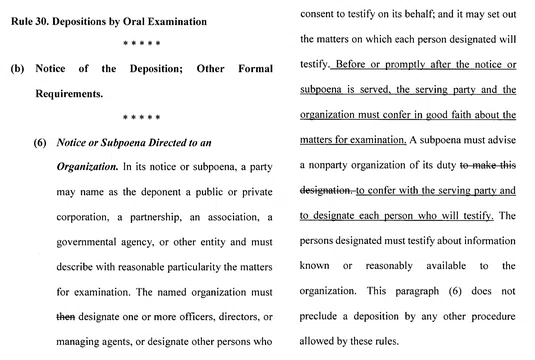
FRCP 30(b)(6) allows a party to notice the deposition of a corporation or other organization on a list of topics. That organization then presents one or more designees to testify on its behalf at deposition. The designee's testimony is treated as that of the corporation.
At trial, it's not unusual for a party to want to play the 30(b)(6) deposition testimony of an opposing party, even if the designee who gave the testimony also happens to be testifying as a fact witness.
Why? Because, often times, the party got exactly what they wanted out of the 30(b)(6) witness on some topic, and if they play the video they can be assured that it will come in exactly how they want it to. If they have to call the witness instead, the witness may well offer some other version of what they said, and it may be difficult to effectively impeach them with the recorded testimony (e.g., if they can explain it).
It's much easier to just play the testimony and get exactly what you want, which you can then slot right into your closing.
(It's easier for the party submitting the testimony, anyway—it's no fun for anyone involved to have to sit through the playback of deposition videos at trial.)
Rule 32 to the Rescue
Luckily for people who want to rely on recorded 30(b)(6) testimony, Rule 32(a)(3) addresses this scenario. It says:
Deposition of Party, Agent, or Designee. An adverse party may use for any purpose the deposition of a party or anyone who, when deposed, was the party's officer, director, managing agent, or designee under Rule 30(b)(6) or 31(a)(4).
Parties rely on this to play the video of 30(b)(6) testimony of the adverse party at trial. That's one of the advantages of a 30(b)(6) deposition—it gives you the views of the corporation itself, rather than of a witness.
But Wait! FRE 611 Allows the Court to Say Otherwise
That's why I was surprised by the parties' arguments in Jazz Pharmaceuticals, Inc. v. Avadel CNS Pharmaceuticals, LLC, C.A. No. 21-691-GBW (D. Del.) this week.
There, the defendant wanted to present the 30(b)(6) testimony of a corporation, by video. Opposing counsel pushed back, arguing that the 30(b)(6) deponent would be testifying as an individual witness in their personal capacity, and that also presenting the 30(b)(6) testimony would be confusing under FRE 611.
FRE 611 is a general rule that gives the Court "reasonable control" over the presentation of witnesses:
(a) Control by the Court; Purposes. The court should exercise reasonable control over the mode and order of examining witnesses and presenting evidence so as to:
(1) make those procedures effective for determining the truth;
(2) avoid wasting time; and
(3) protect witnesses from harassment or undue embarrassment.
The Court agreed that, under FRE 611, the defendant could not offer the opposing party's 30(b)(6) testimony, other than for impeachment:
ORAL ORDER: Having reviewed the parties' respective letter briefs . . . regarding Jazz's motion to limit the use of Rule 30(b)(6) deposition testimony during trial, the Court notes that live testimony is preferable to deposition testimony, Federal Rule of Civil Procedure 32(a)(3) is not without any limits, and the Court has some discretion on the issue. Accordingly, under the circumstances of this case, IT IS HEREBY ORDERED that, if Jazz's Rule 30(b)(6) witness in dispute, is available for live testimony during Avadel's case-in-chief on rebuttal, the Court will allow the use of the video excerpts from the Rule 30(b(6) depositions for impeachment purposes only.
The Court made clear what it meant by "impeachment purposes only":
In other words, Avadel must question the witness live during Avadel's case-in-chief on rebuttal, if the witness remains available for live testimony. Only if the witness answers a question inconsistent with the prior deposition testimony may Avadel use video excerpts of the prior deposition testimony for impeachment purposes.
The Court did say that if the witness is not available, the 30(b)(6) testimony can be used:
If the Rule 30(b)(6) witness in dispute is not available for live testimony during Avadel's case-in-chief on rebuttal, then Avadel may use the designated video excerpts in place of questioning the witness live and Jazz may counter-designate. . . . ORDERED by Judge Gregory B. Williams on 2/20/24.
Notably, the Court limited its ruling to "the circumstances of this case." But, regardless, I expect this will be a cite we'll see going forward in Judge Williams cases (and likely cases before other judges).
Also, there is no obvious reason why this would not apply to the deposition testimony of an "officer, director, [or] managing agent" under FRCP 32. Typically a party can offer their recorded testimony independently "for any purpose" as well, under FRCP 32.
If you enjoyed this post, consider subscribing to receive free e-mail updates about new posts.

